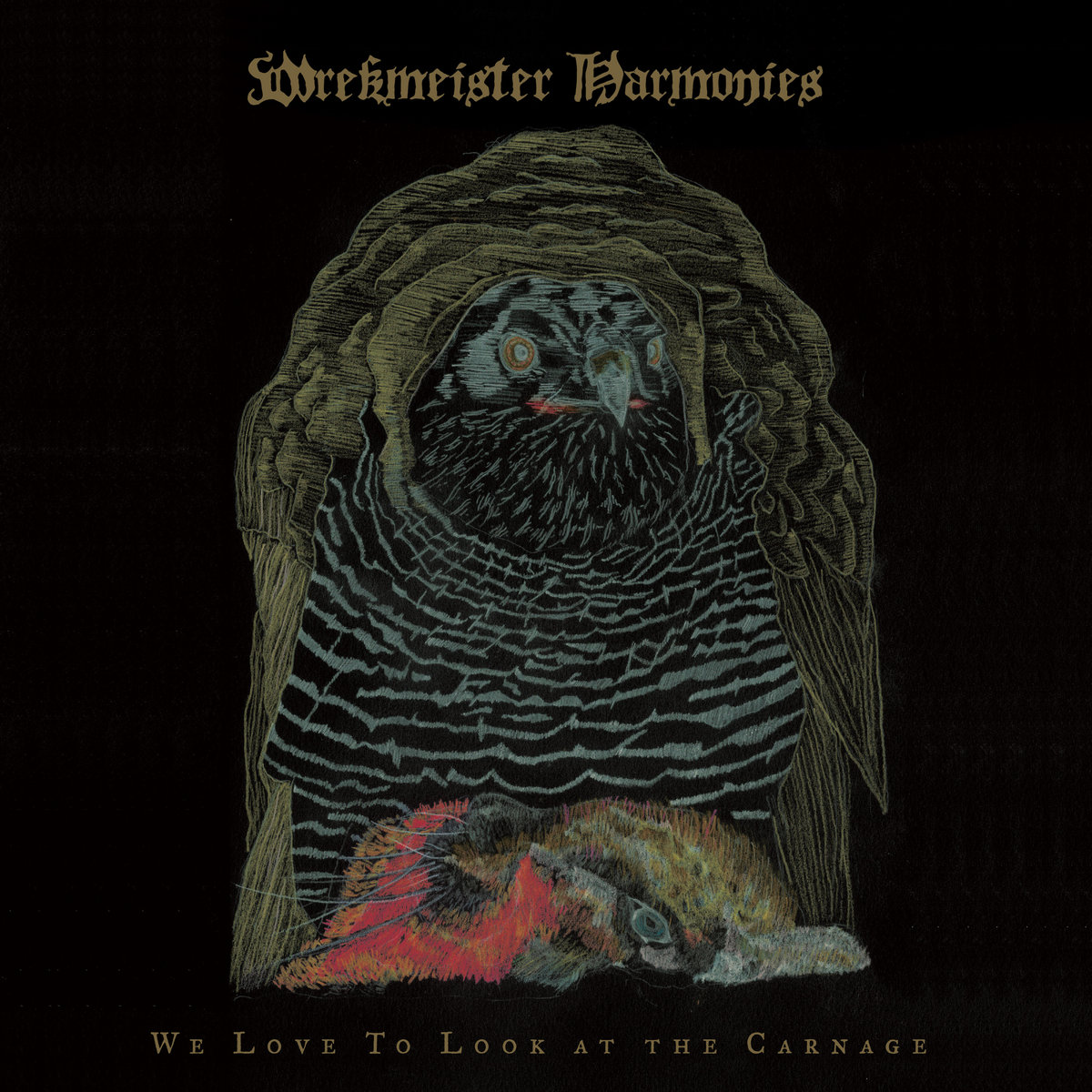 JR Robinson and Esther Shaw explore the Greek philosophy of Stoicism and the path to happiness known as eudaimonia for this new album with the addition of Thor Harris (Swans) and Jamie Stewart (Xiu Xiu). This is a contrast to the prior album, The Alone Rush, which was steeped in personal tragedy. To achieve eudaimonia involves accepting the present moment as it exists, and not to be controlled by pleasure or fear of that moment. Wrekmeister Harmonies present a form of eudaimonia through We Love to Look at the Carnage with songs that expose the strength achieved through victory over darkness. Written in Oregon in near total isolation, the music feels like a winter evening in the Northern Hemisphere. Their translation of winter to sound is marked by understated grim simplicity, melodies syncopated with urgent resignation through orchestral gloom, and a mastery of emotional subtlety. It is an intensely intimate musical journey that begins at night but ends in the promise of a new day.
JR Robinson and Esther Shaw explore the Greek philosophy of Stoicism and the path to happiness known as eudaimonia for this new album with the addition of Thor Harris (Swans) and Jamie Stewart (Xiu Xiu). This is a contrast to the prior album, The Alone Rush, which was steeped in personal tragedy. To achieve eudaimonia involves accepting the present moment as it exists, and not to be controlled by pleasure or fear of that moment. Wrekmeister Harmonies present a form of eudaimonia through We Love to Look at the Carnage with songs that expose the strength achieved through victory over darkness. Written in Oregon in near total isolation, the music feels like a winter evening in the Northern Hemisphere. Their translation of winter to sound is marked by understated grim simplicity, melodies syncopated with urgent resignation through orchestral gloom, and a mastery of emotional subtlety. It is an intensely intimate musical journey that begins at night but ends in the promise of a new day.
The journey begins at "Midnight to Six," greeted by Shaw’s piano and angelic vocals, belying the downturn to come when Robinson’s deep baritone enters. Robinson insists "With a pain in my side, all the hours collide along a fault line" before being haunted by Harris’ urgent and pounding percussion, fading into a defiant wind that bridges to "Still Life with Prick Cancer." All seems well on the journey until Stewart’s choppy vocals, overlaid by warning bells and the clang of hammer on steel, indicate otherwise. All members combine forces after the 3-minute mark with a jumble of drone reminiscent of the band’s previous punch moments. Robinson informs us that "locked in silence at 4 a.m., a flower blooms inside my chest, with so much passion it makes the blood sing," echoed by a sonic commotion that bleeds the song into…
Savage Beauty; a perfect description for the power of "Coyotes of Central Park." The most melodic of the album, this is the most conventional Wrekmeister have ever been, with my only complaint that the song may be too short. Savage beauty is exactly what Robinson implores as he encourages us to "See how they dance in the pale blue moonlight, no one hears them, no one knows the savage beauty of having the moon by the throat."
Savage beauty leads the way to savage reality with "The Rat Catcher." Shaw’s and Robinson’s interweaving instrumentation would indicate the journey’s remainder will be easy, but peaceful journeys don’t include "spent half my time putting the lights out, blinding myself with whatever I could stick into my arm." Calm makes way for waves of tension, layered with Stewart’s creepy electronics, the crescendo of Robinson’s guitar, Shaw’s wailing violin, and colored by Harris’ cold percussive clangs before descending into chaos that fades away into the deceivingly gentle but lyrically harrowing "Immolation." With an onslaught of metal that Wrekmeister is known for, the journey ends with a beautiful mess of guitars, chants, drones, and stark electronics.
The intense peaks and valleys audible on prior albums have been refined, and this subtlety is precisely what makes We Love to Look at the Carnage their most powerful work to date. Vocals are smoothed in support of more melodic, gentle embellishments. Their lyrical craft is at their strongest and worth the closer listen. There is nothing upbeat or bouncy about this album. For perspective, writing this review on a gray, rainy day with the events of 2020 in the background was a genuine strain on my mental attitude, but We Love to Look at the Carnage was the perfect soundtrack to match. Wrekmeister Harmonies offers shelter from the storms we face each day within each song by claiming victory, to travel through that metaphorical bleak winter night and come out the other side and break through to the sun of a new day.
Read More

